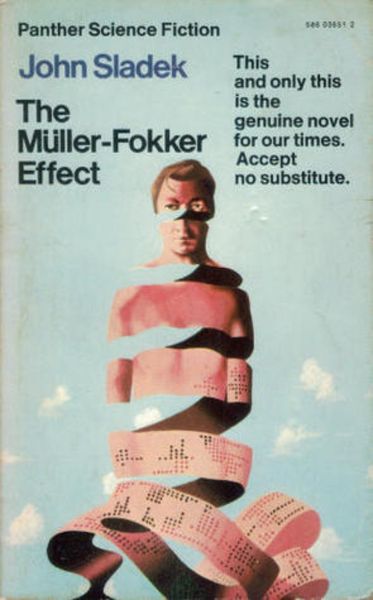Rise Again
The Muller-Fokker Effect
By John Sladek

4 Jun, 2023
John Sladek’s 1970 The Muller-Fokker Effect is a stand-alone satirical novel.
Bob Shairp is a technical writer reduced to editing computer-generated text. Bob is married to Marge. Together, they have a son named Spot, who is obsessed with military school. The Shairps are spied upon by National Arsenamid owner MacCormick Hines, a deranged oligarch who believes the Shairps to be characters in a drama staged for his entertainment.
Much to his wife Marge’s displeasure, National Arsenamid eliminates Bob’s job. The family’s financial security is salvaged when Bob is assigned the task of human research subject. What he experiences blows his mind.
More exactly, a workplace mishap blows Bob’s head off.
Providentially, all the parameters that define Bob were recorded on the cutting-edge (and thanks to inventor Muller-Fokker’s disappearance, unique) Muller-Fokker tapes. Provided one could get all four tapes and a host body, Bob could be reincarnated.
In the aftermath of the mishap, the tapes are classified as surplus and sold to different buyers. As a consequence of the sales, American history in the year 19xx will be transformed. The novel pursues a number of threads, to wit:
● Marge is recruited by National Arsenamid to play “Bette Cooke” (A thinly disguised Betty Crocker), the face of the company’s food division. She enjoys success, at the cost of relentless sexual harassment from her boss Mr. Bradd and being forced to submit to cold-sleep to extend her career.
● Spot attends St Praetexta Military Academy, for which he is unsuited and where he is comprehensibly miserable. Cut off from contact with Marge, his thoughts turn to escape and suicide1.
● The Jess Hurch Society (a thinly disguised John Birch Society) which has dwindled to Amy Birdsall and Grover Minus, ostensibly pursues “cumminisks.” In fact, Amy is desperately pursuing Grover but her efforts to convey to him her adoration are unsuccessful.
● Glen Dale (a thinly disguised Hugh Heffner), publisher of Stagman magazine (a thinly disguised Playboy) spends the novel desperately trying to get laid. He is unaware that he is still a virgin at age forty because underlings are convinced that Stagman’s success is dependent on Dale’s sexual frustration. They methodically sabotage Dale’s attempts to lose his virginity.
● Preacher Billy Koch (a thinly disguised Billy Graham) has successfully combined rudimentary American folk religion and televised spectacle into a thriving business. When a traffic accident leaves Billy severely brain-damaged, his underlings consign him to home care and use an android to replace him.
● Virulent racist Wes Davis recapitulates Adolf Hitler’s career, somehow fumbling his way through failure after failure towards national prominence. Davis’ plans to exile or exterminate every African-American seem unstoppable, unless somehow Davis provides his own downfall.
Plot threads interweave towards a scientific miracle: the glorious resurrection of Bob.
~oOo~
I used “African-American” above but that is not the term used in the text. While Sladek isn’t in any way sympathetic to Davis, having Davis as a main character means a lot of the narrative consists of Davis’ vulgar ranting about Black people. As well, as is so often true of novels of this vintage, the book is kind of rapey and only some of the miscreants get their just punishment.
It’s always fun to learn new things as a consequence of rereading old books. In this case, I discovered from his ISFDB entry that Sladek wrote a gothic, The Castle and the Key, under the penname Cassandra Knye. I will have to chase that down….

One might argue that Sladek was an underappreciated satirist. That is why it’s not entirely surprising that the novel name-checks another arguably underappreciated SF author of the same day, Thomas M. Disch, who (according to Sladek) was the author of “The Geocides, (and) Mankind under the Lash.” Those titles are manglings of Disch’s real-life The Genocides and Mankind Under the Leash. I blame the misspelling of the titles on those Muller-Fokkers at the Labor Day group2.
Those familiar with Sladek’s works will not be terribly surprised to discover that, in his opinion, those in power are usually misguided or worse. Their exalted status has exempted them from botherations like restraint, fact checking, or common sense [3]. The handful of decent people in the narrative are powerless and subject to the whims of their unchecked masters. History, in Sladek’s view, is an absurd joke.
On the minus side, the plot, which isn’t especially structured to begin with, descends into increasing chaos towards the conclusion. To call it an energetic hot mess wouldn’t be entirely fair because it is clear that Sladek had a particular destination in mind. Let’s just say that it’s episodic.
Having consulted the ISFDB, I could not help but notice [4] that there was a ten-year hole in Sladek’s novel publishing career, a gap between The Muller-Fokker Effect and his next novel Roderick or The Education of a Young Machine. On the other hand, Robert Anton Wilson and Robert Shea’s Illuminatus Trilogy is even more of a shambles and much, much “jesus will this never end” longer, and it does not seem to have knee-capped Wilson’s career. Did The Muller-Fokker Effect not sell well? Perhaps the gap between The Muller-Fokker Effect and Roderick is due to that. Or is there some other explanation for the gap? Further research is required, although I don’t plan to carry it out.
One might think that a novel that seems to require a familiarity with the events, fads, and public figures of the late 1960s would be a mystery to modern readers. I was surprised to find that many elements of this book have aged well. One could rewrite it as a modern day satirical take on current fads and public figures without having to alter the events of the plot significantly [5]. It is almost as though the human foibles at play in the 1960s are still with us today.
The Muller-Fokker Effect is available here (Amazon US), here (Amazon Canada), here (Amazon UK), here (Apple Books), here (Barnes & Noble), and here (Chapters-Indigo).
1: Spot’s misery (and the fact he goes AWOL) arguably save his life, as it means Spot is not available to be selected for service in former Praetexta President General Flamel (‘Rocky’) Rockstone’s visionary and quite doomed Pink Barrettes, all of whom suffer a miserable death due to a routing mishap.
2: A reliable search engine may be your friend in this matter. Although bear in mind Miskatonic U’s motto: ex ignorantia ad sapientiam; ex luce ad tenebras2.
3: Events do play out according to Hines’ expectations but of course, there is a reason for that.
4: I didn’t notice the hiatus when I was a teen because I encountered Sladek in the mid-to-late 1970s. The supply of new-to-me used copies of his backlist concealed the gap.
5: Swathes of the latter part of the book recall the police riots of 2020, which is not terribly surprising because the 2020 police riots were remarkably like those of 1968, which were probably among Sladek’s inspirations.
